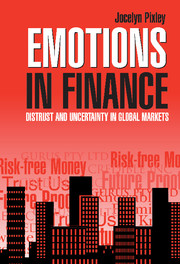Book contents
- Frontmatter
- Dedication
- Contents
- Figures
- Interviews 2000–2002
- Preface
- Abbreviations
- 1 Global Markets or Social Relations of Money
- 2 Emotion in the Kingdom of Rationality
- 3 The Financial Media as Institutional Trust Agencies
- 4 Emotions in the Boardroom
- 5 Credibility and Confidence in the Central Banks
- 6 Hierarchies of Trust
- 7 Overwhelmed by Numbers
- 8 The Time Utopia in Finance
- 9 Implications: Emotions and Rationality
- References
- Index
8 - The Time Utopia in Finance
Published online by Cambridge University Press: 05 July 2014
- Frontmatter
- Dedication
- Contents
- Figures
- Interviews 2000–2002
- Preface
- Abbreviations
- 1 Global Markets or Social Relations of Money
- 2 Emotion in the Kingdom of Rationality
- 3 The Financial Media as Institutional Trust Agencies
- 4 Emotions in the Boardroom
- 5 Credibility and Confidence in the Central Banks
- 6 Hierarchies of Trust
- 7 Overwhelmed by Numbers
- 8 The Time Utopia in Finance
- 9 Implications: Emotions and Rationality
- References
- Index
Summary
Here we look at the morale behind the financial world's expectations. How else is it possible to explain institutional memory loss? Criticisms which reduce the financialisation of life to an ideological triumph of libertarianism are an oversimplification. These days, democracies are openly divided by suspicions, public conflicts and social movements. What orthodoxy presents as an aggregate of individuals, bargaining anonymously – independently – in financial markets, is in fact a social field of mighty organisations struggling over internal credibility. Other fields contend too. Images of herds with amorphous mood-states (during alleged financial instability) are as ideological as rational actor assumptions. Consider the Jubilee debt relief movement led by the established world religions, or the legal and governmental challenges and waves of protests against the excesses of global policies. ‘Stop the MAI’ movement triumphed after a mooted Multilateral Agreement on Investment (MAI) was leaked from the OECD in 1997 and hastily withdrawn. MAI sneaked back, with a new label, again to fail at a divisive Cancun meeting of the WTO in 2003. The European and Canadian-led ATTAC movement proposes a Tobin tax on currency speculation (named after an economist, James Tobin). Less dramatic, as perhaps prosaically interest-based, are shareholders' revolts and their unseemly behaviour at annual general meetings of banks and corporations in the ‘core’. Such a sample of recent activity provides ample evidence that millions of people around the world are not duped by the financial sector's self-rationalisations.
- Type
- Chapter
- Information
- Emotions in FinanceDistrust and Uncertainty in Global Markets, pp. 157 - 182Publisher: Cambridge University PressPrint publication year: 2004

